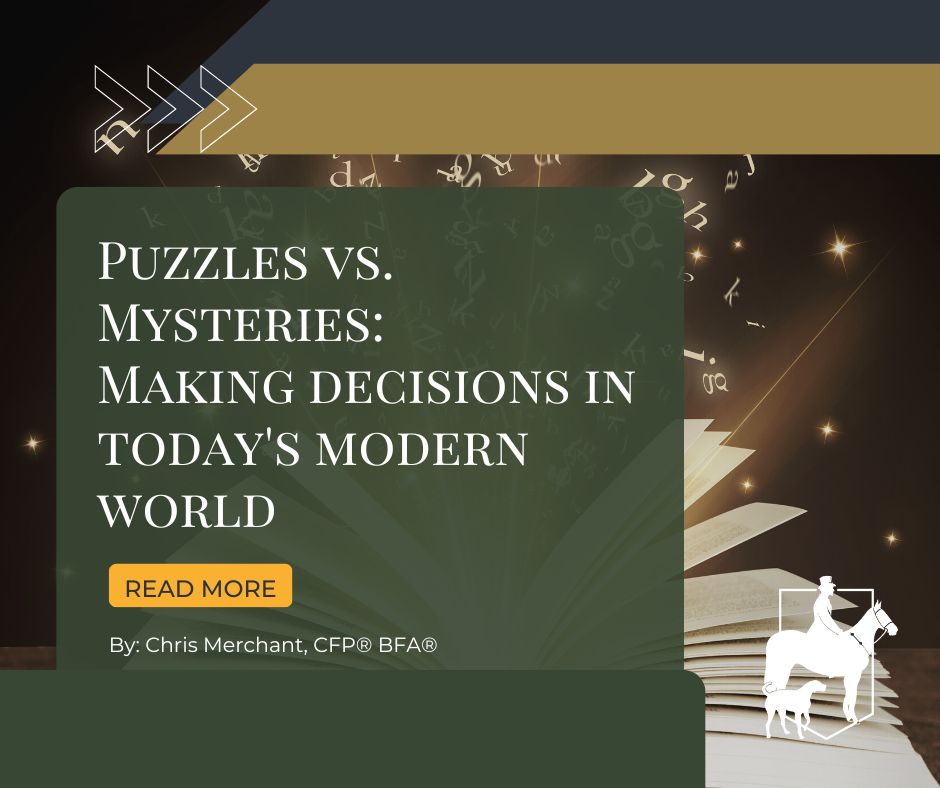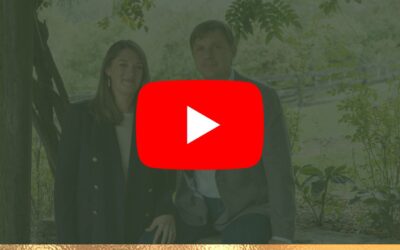Puzzles vs. Mysteries: Making Decisions in Today’s Modern World
By: Chris Merchant, CFP® BFA®
Do you feel overwhelmed by the amount of information in your life?
Malcolm Gladwell says we are now living in a world of mysteries, where the traditional approach of gathering all the data and trying to find a solution no longer works. He introduces the idea of puzzles vs. mysteries as a new way to think about decision-making in today’s world.
If you’re looking for a new way to make decisions (particularly financial), this article is for you. It will help you navigate through the overwhelming amount of information available to you and figure out what course of action to take.

Several weeks ago, Heather and I attended a conference in San Antonio, TX. One of the guest speakers was Malcolm Gladwell, the bestselling author of The Tipping Point, Blink, and Outliers.
I’m a fan, having read many of his books. And yes, his hair did look as wild in person as it appears in the pictures on the insides of his book covers. But that wasn’t why I was so interested in his speech.
Gladwell said that solving problems today is not a matter of not having enough information but rather navigating the overwhelming level of having too much information. His research shows that this overabundance of information is overwhelming our processing capabilities.
He summarizes the complexity of this issue into what he called:
Puzzles vs. Mysteries.
We all know making decisions is hard. But what if you’re not sure of which type of problem you are dealing with? Is it a puzzle or a mystery?
I found this topic extremely relevant to the challenges facing modern retirees and investors today as they make important decisions about which path to follow for their finances and their future.
Puzzles are problems that come to satisfying conclusions.
Solving a puzzle just requires more information.
On the other hand, mysteries are not solved by gathering more information.
Solving a mystery is a matter of making sense of massive amounts of data and using your analysis, experience, and judgment to form a conclusion. You rely on your processing capabilities to decide which path to take.
Here is an explanation of the difference between mysteries and puzzles by Gregory Treverton, whom Gladwell credits with first articulating the puzzle vs. mystery paradigm.
“There’s a reason millions of people try to solve crossword puzzles each day. Amid the well-ordered combat between a puzzler’s mind and the blank boxes waiting to be filled, there is satisfaction along with frustration. Even when you can’t find the right answer, you know it exists. Puzzles can be solved; they have answers.
But a mystery offers no such comfort. It poses a question that has no definitive answer because the answer is contingent; it depends on a future interaction of many factors, known and unknown. A mystery cannot be answered; it can only be framed, by identifying the critical factors and applying some sense of how they have interacted in the past and might interact in the future. A mystery is an attempt to define ambiguities.” -Gregory Treverton
Gladwell expanded on this explanation in his talk…
“Diagnosing prostate cancer used to be a puzzle; for example, the doctor would do a rectal exam and feel for a lumpy tumor on the surface of the patient’s prostate.
These days, though, we don’t wait for patients to develop the symptoms of prostate cancer. Doctors now regularly test middle-aged men for elevated levels of PSA, a substance associated with prostate changes. If the results look problematic, they use ultrasound imaging to take a picture of the prostate. Then they perform a biopsy, removing tiny slices of the gland and examining the extracted tissue under a microscope.
Much of that flood of information, however, is inconclusive: elevated levels of PSA don’t always mean that you have cancer, and normal levels of PSA don’t always mean that you don’t—and, in any case, there’s debate about what constitutes a “normal” PSA level.
Nor is the biopsy definitive: because what a pathologist is looking for is early evidence of cancer—and in many cases, merely something that may one day turn into cancer—two equally skilled pathologists can easily look at the same sample and disagree about whether there is any cancer present.
Even if they do agree, they may disagree about the benefits of treatment, given that most prostate cancers grow so slowly that they never cause problems. The urologist is now charged with the task of making sense of a maze of unreliable and conflicting claims. He is no longer confirming the presence of a malignancy. He’s predicting it, and the certainties of his predecessors have been replaced with outcomes that can only be said to be “highly probable” or “tentatively estimated.
What medical progress has meant for prostate cancer—and, as the physician, H. Gilbert Welch argues in his book “Should I Be Tested for Cancer?” for virtually every other cancer, as well—as the transformation of diagnosis from a puzzle to a mystery.”
The point Gladwell is trying to make is that the problems we face today have transformed from puzzles to mysteries because of the growth of available information and the ease with which we can access it via our computers, smartphones, and the internet.
The launch of health websites like WebMD caused worried experts to believe there would be a decline in the need for traditional doctors. However, what’s happened is that people have started self-diagnosing all the worst possible scenarios. With specialty doctors’ help to analyze these problems, the medical field saw a significant increase in demand.
The lesson is that the complex, uncertain issues that the modern world throws at us require the mystery paradigm.
Personal finance – especially Investing and retirement planning used to be a puzzle. Get the right information, execute it, and you were set.
Now it’s a mystery…
While in the past access to information was limited, now our devices offer users more data than even the most experienced financial firms did a few decades ago. The issue isn’t a lack of information, but rather being able to decipher it and make sound judgments based on what is presented.
We must accept that the transactional method of solving a puzzle (getting more information) will not lead to the results we want in today’s modern world.
Today is a world of mysteries, of making sense of a large amount of data to make good decisions. That requires insight, experience, analysis, and judgment.
As illustrated by the WebMD example, Gladwell lays out how crucial it is to have professional intermediaries who can filter information and help us draw sound conclusions.
This is true not only in the medical field but also in finance.
An experienced financial advisor can help you navigate the complexities of modern markets and financial unknowns and make sure that clients are making decisions based on sound analysis – rather than just relying on data alone.
At Hunt Country Wealth Management, our specialty is helping you with the complexities and uncertainties of your financial future in retirement. So, when faced with a financial mystery, don’t go it alone.
We’re here to help!
Want to learn more?
Gladwell went in-depth into the difference between “puzzle” and “mystery,” providing abundant examples for both.
The puzzle-vs.-mystery topic was from one of his articles in The New Yorker.
View the full Malcolm Gladwell article here: https://www.newyorker.com/magazine/2007/01/08/open-secrets-3
Malcolm Gladwell. “Enron’s Open Secrets.” The New Yorker, January 8, 2007 Issue. https://www.newyorker.com/magazine/2007/01/08/open-secrets-3. Accessed December 10, 2022.




